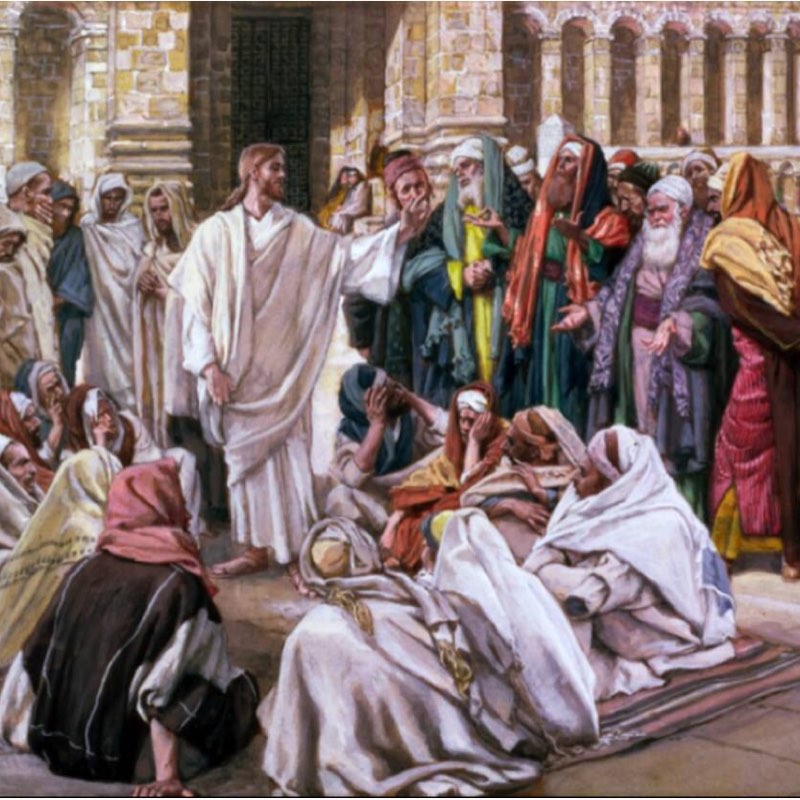Jesus was teaching in the Temple area. He asked, "Why do the teachers of the law say that the Messiah is the son of David?
With the help of the Holy Spirit, David himself says, 'The Lord (God) said to my Lord ( my master): Sit by me at my right side, and I will put your enemies under your control. '
David himself calls the Messiah 'Lord.' So how can the Messiah be David's son?" Many people listened to Jesus and were very pleased.
It has been argued by some Muslims that Jesus denies in Mark 12, verses 35 to 37, that the messiah Jews are looking for is a descendant of David. There is also a similar account in Luke 20, verses 41 to 44, and Matthew 22, verses 41 to 46. Their point of contention is that Jesus refers to Muhammad rather than himself. What is the significance of this argument?
The argument that Jesus refers to Muhammad in the above statements rather than to himself as the Messiah, and suggests that the Messiah Jews are awaiting is not a descendant of David, is an interpretation that emerges from a particular reading of these biblical passages in light of Islamic prophecy and eschatology.
This interpretation is not found within mainstream Christian theology but is part of Muslim perspectives that see Muhammad as the final prophet foretold in earlier scriptures, including the Bible. Here's how this argument is typically explained:
1. Jesus' Questioning: Among Muslims, Jesus' questioning is interpreted as a rejection of the idea that the Messiah is a physical descendant of David. Instead, they propose that Jesus is hinting at a more profound spiritual truth about the Messiah's identity. This interpretation is seen as opening the door to the idea that Jesus might be indicating the coming of another prophet (Muhammad), as per Islamic belief, who is considered the final prophet and a messenger in Islam.
2. Jewish Expectation: At the time, many Jews expected the Messiah to be a political or military leader who would liberate Israel from Roman rule. This expectation was based on various Old Testament prophecies that the Messiah would come from David’s lineage.
3. Reference to Muhammad: Some Muslims interpret Jesus' reference to "my Lord" as a prophecy about Muhammad, who is considered in Islam to be the final prophet and a "Spiritual Messiah." This interpretation is bolstered by Islamic teachings that regard Muhammad as the "Praised One" (which is what the name Muhammad means) and as fulfilling biblical prophecies about a final messenger.
4. Distinction from Davidic Lineage: By focusing on the term "Lord" and the context in which Jesus presents his argument, some Muslims see this as a clear indication that the coming Messiah, who they believe is Muhammad, would have a different role and authority than the one traditionally ascribed to the Davidic Messiah. This reading suggests that Jesus was pointing to the advent of a new spiritual leader who would come from the lineage of Ishmael, not Isaac, thus not being a direct descendant of David but still fulfilling the role of a Messiah.
5. Islamic Eschatology and Prophecy: This interpretation is part of a broader Islamic eschatological view that sees Jesus and Muhammad as connected within God's plan for humanity. Jesus is seen as heralding the coming of Muhammad, with his mission serving as a bridge between Jewish expectations of a Messiah and the arrival of the final prophet, Muhammad.
It's important to note that this interpretation is specific to Islamic theology and is not shared by Jewish or Christian traditions, which have their own understandings of the Messiah and the prophecies concerning him.
Jewish tradition continues to await the Messiah as a future leader of the Jewish people who will bring about a period of peace and righteousness. Christian tradition, on the other hand, identifies Jesus himself as the Messiah and Son of God, fulfilling Old Testament prophecies through his life, death, and resurrection.

